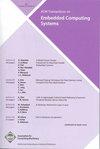An Asynchronous Compaction Acceleration Scheme for Near-Data Processing-enabled LSM-Tree-based KV Stores
IF 2.8
3区 计算机科学
Q2 COMPUTER SCIENCE, HARDWARE & ARCHITECTURE
引用次数: 0
Abstract
LSM-tree-based key-value stores (KV stores) convert random-write requests to sequence-write ones to achieve high I/O performance. Meanwhile, compaction operations in KV stores update SSTables in forms of reorganizing low-level data components to high-level ones, thereby guaranteeing an orderly data layout in each component. Repeated writes caused by compaction ( a.k.a, write amplification) impacts I/O bandwidth and overall system performance. Near-data processing (NDP) is one of effective approaches to addressing this write-amplification issue. Most NDP-based techniques adopt synchronous parallel schemes to perform a compaction task on both the host and its NDP-enabled device. In synchronous parallel compaction schemes, the execution time of compaction is determined by a subsystem that has lower compaction performance coupled by under-utilized computing resources in a NDP framework. To solve this problem, we propose an asynchronous parallel scheme named PStore to improve the compaction performance in KV stores. In PStore, we designed a multi-tasks queue and three priority-based scheduling methods. PStore elects proper compaction tasks to be offloaded in host- and device-side compaction modules. Our proposed cross-leveled compaction mechanism mitigates write amplification induced by asynchronous compaction. PStore featured with the asynchronous compaction mechanism fully utilizes computing resources in both host and device-side subsystems. Compared with the two popular synchronous compaction modes based on KV stores (TStore and LevelDB), our PStore immensely improves the throughput by up to a factor of 14 and 10.52 with an average of a factor of 2.09 and 1.73, respectively.基于lsm树的近数据处理KV存储异步压缩加速方案
基于lsm树的键值存储(KV存储)将随机写请求转换为顺序写请求,以实现高I/O性能。同时,KV存储中的压缩操作以将底层数据组件重组为高层数据组件的形式更新sstable,从而保证了各个组件中的数据有序布局。由于写压缩(又称写放大)导致的重复写会影响I/O带宽和系统整体性能。近数据处理(NDP)是解决这个写放大问题的有效方法之一。大多数基于ndp的技术采用同步并行方案,在主机及其支持ndp的设备上执行压缩任务。在同步并行压缩方案中,压缩的执行时间由压缩性能较低的子系统以及NDP框架中未充分利用的计算资源决定。为了解决这个问题,我们提出了一种名为PStore的异步并行方案来提高KV存储的压缩性能。在PStore中,我们设计了一个多任务队列和三种基于优先级的调度方法。PStore在主机侧和设备侧的压缩模块中选择适当的压缩任务进行卸载。我们提出的交叉级别压缩机制减轻了异步压缩引起的写放大。PStore采用异步压缩机制,充分利用主机端和设备端子系统的计算资源。与基于KV存储的两种流行的同步压缩模式(TStore和LevelDB)相比,我们的PStore极大地提高了吞吐量,最高可达14倍和10.52倍,平均分别为2.09和1.73倍。
本文章由计算机程序翻译,如有差异,请以英文原文为准。
求助全文
约1分钟内获得全文
求助全文
来源期刊

ACM Transactions on Embedded Computing Systems
工程技术-计算机:软件工程
CiteScore
3.70
自引率
0.00%
发文量
138
审稿时长
6 months
期刊介绍:
The design of embedded computing systems, both the software and hardware, increasingly relies on sophisticated algorithms, analytical models, and methodologies. ACM Transactions on Embedded Computing Systems (TECS) aims to present the leading work relating to the analysis, design, behavior, and experience with embedded computing systems.
 求助内容:
求助内容: 应助结果提醒方式:
应助结果提醒方式:


